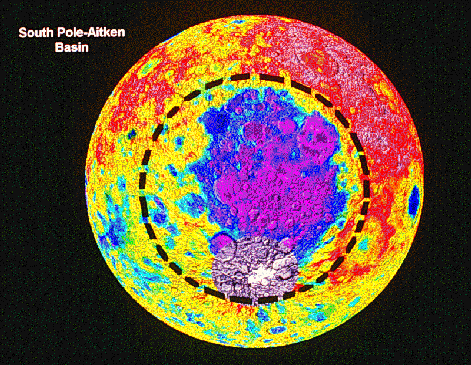Astronomy Picture of the Day
Discover the cosmos!
Each day a different image or photograph of our fascinating universe is
featured, along with a brief explanation written by a professional
astronomer.
September 6, 1996

The Largest Impact Crater
Credit:
The Clementine Project
Explanation:
What is the largest known
impact crater in the Solar System?
Over 1300 miles across, the South Pole-Aitken
Basin on the farside
of Earth's Moon holds that distinction.
Circled above in a false color mosaic
of Clementine images it was caused when
an asteroid or
comet sized object
crashed into the surface, penetrating the lunar mantle.
In general, the rocky terrestrial planets and moons are scarred
and battered from frequent repeated bombardment by large objects during our
Solar System's early years.
On Earth, continuous geological activity
has hidden much of the damage,
but the surface of the smaller,
less active Moon bears testimony to a
shared history of fierce and frequent impacts.
At the present time in the vicinity of Earth,
the bombardment continues -
fortunately at
a greatly reduced rate.
Tomorrow's picture: Two Billion Years After the Big Bang
| Archive
| Index
| Search
| Glossary
| Education
| About APOD |
Authors & editors:
Robert Nemiroff
(MTU) &
Jerry
Bonnell (USRA).
NASA Technical Rep.:
Sherri
Calvo.
Specific rights apply.
A service of:
LHEA
at
NASA/
GSFC
